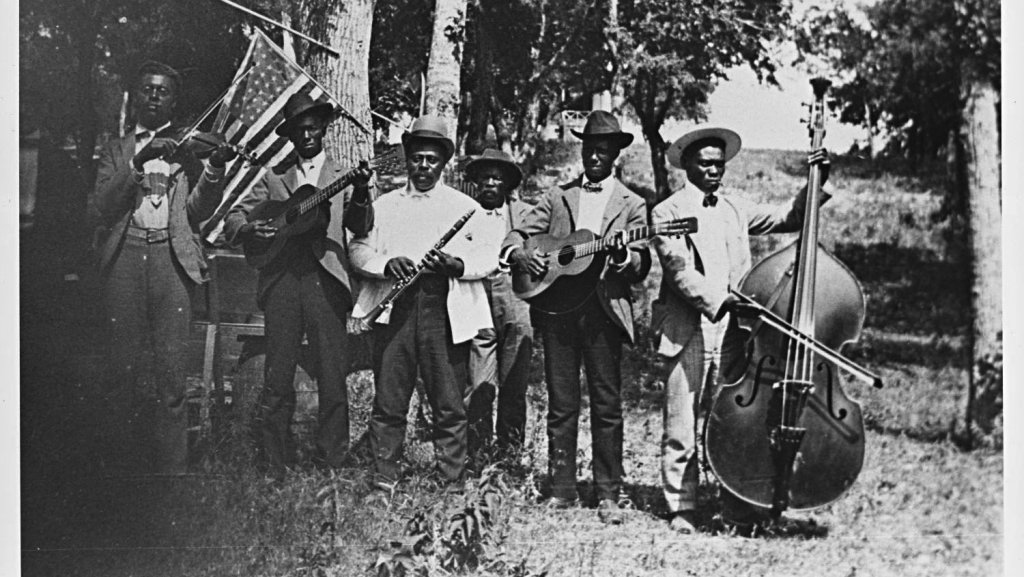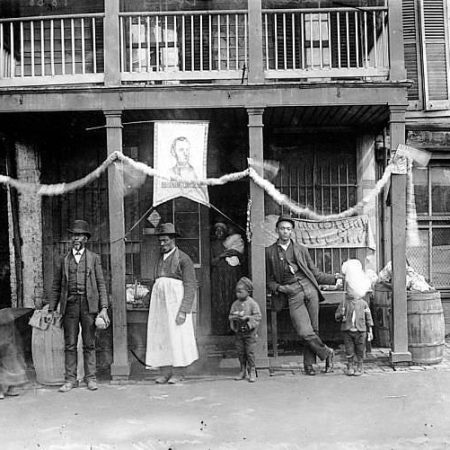Created Equal: The legacy of Juneteenth, nearly 160 years later
Jenny Sherman, Madison Ganzak June 19, 2024In celebration of the now federal holiday, we take a look back at some previous conversations on the show that examine racial equity in the United States.

Emancipation Day Celebration band in Texas, June 19, 1900.
Juneteenth marks our nation’s second independence day — when the last of America’s slaves were freed by executive decree.
Though President Abraham Lincoln signed the Emancipation Proclamation on January 1, 1863, it wasn’t fully realized until June 19, 1865, when some 2,000 Union troops arrived in Galveston Bay, Texas — the country’s last Confederate stronghold — and announced that the more than 250,000 enslaved Black people in the state were free.

The day has long been celebrated by the African American community, but nearly 160 years later, how do Americans commemorate the now federal holiday? And what legacy has the Emancipation Proclamation left behind? On today’s episode of Created Equal, we take a look back at some previous conversations on the show that examine racial equity and history in the United States, in celebration of the Juneteenth holiday.
Subscribe to Created Equal on Apple Podcasts, Spotify, Google Podcasts, NPR.org or wherever you get your podcasts.
The battle for integration continues
Gary Orfield, distinguished research professor at UCLA, joined Created Equal last month to discuss a recent report he co-authored for UCLA’s Civil Rights Project that says segregation has been trending upward for decades.
The report, titled “The Unfinished Battle for Integration in a Multiracial America from Brown to Now,” suggests that while the South is dramatically less segregated than it was before the Brown decision, its goals have not been fully attained.
“It was 10 years after Brown, 98% of Black students were still in completely segregated schools, and there were virtually no Black teachers teaching white students across the 17 states that had segregation by law,” he said. “Only after the 1964 Civil Rights Act was passed did, we really get integration, and then we got a lot of integration over the Johnson administration period when this law was actually enforced.”
Coalition challenges I-375 project
Detroit resident Olga Stella is part of a coalition of community voices challenging MDOT’s “I-375 Reconnecting Communities Project” to replace the one-mile stretch of freeway on the east side of downtown Detroit with a multi-lane boulevard.
When the freeway was built in the early 1960s, it destroyed two historically Black neighborhoods in the city and displaced residents. Stella joined Created Equal last month, along with BridgeDetroit reporter Malachi Barrett and fellow coalition member Carl Bentley, to discuss ways to balance efforts to repair the damage done by the highway.
Stella says members of the ReThink I-375 coalition believe MDOT’s initial plans aren’t doing enough to repair the history, adding that residents also have concerns about the road’s walkability and safety.
“The kinds of concerns that we’re hearing from our neighbors and small businesses are about pedestrian safety, about public safety, access to the Detroit Medical Center which will be severely impacted by the design of this project,” Stella said.
Omitting America’s racial history
Last summer, the Florida State Board of Education faced backlash for updating standards on how African American history should be taught in the state’s public schools, including controversial language about teaching students how some Black Americans gained useful skills because of slavery.
In February, host Stephen Henderson spoke with Princeton African American studies professor Eddie Glaude about what caused the American Civil War and how revising or omitting that history impacts all of us.
“What are our social obligations to each other — and what’s the role of government in ensuring that baseline level of existence,” Glaude asked on the show. “We have to have that argument because where we are now is that some people believe that certain things belong to them — that a certain social contract is only relevant to them and to theirs. And the other — all of us — should just simply shut up and be grateful that we’re here.”
Listen to Created Equal with host Stephen Henderson weekdays from 9-10 a.m. ET on 101.9 WDET and streaming on-demand.
